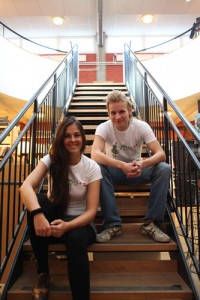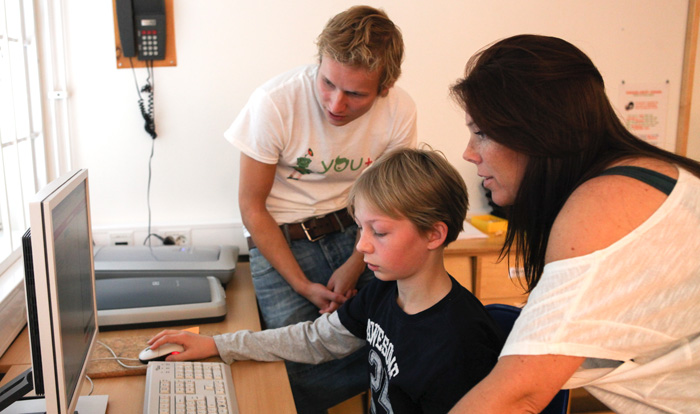The world is becoming more and more digital – but our primary schools are lagging behind. Two former students from Lund University want to program a new curriculum.
The clock soon strikes twelve-thirty and we are eleven people waiting outside the classroom at the Östratornskola. Among us, there are seven schoolchildren and the two central figures for the day: Caroline Mensch and Tim van Dijk. Both are former Master students from the School of Economics and Management at Lund University. They are to present and pilot-test their programming project YOU++ for a group of schoolchildren in fifth grade.
YOU++ is a project for helping schoolchildren and teachers to better understand how computers are built. This will be done through programming and coding – which is far from common knowledge.
After a short presentation of the software, the schoolchildren begin coding themselves. With the help of colourful graphics and clear instructions the class almost becomes like playing a computer game. Coordinates and pixels become dots, forms and letters.
Something for the curriculum
Cecilia Reardon is a teacher at the Östratornskola, and she thinks programming should be a part of the curriculum. She says that she has chosen to name the class we are attending now, an elective module, Technology instead of Programming.
“Otherwise we would have had far too many children here, since the interest is very big”, she says.
In the computer room, everyone seems to be well prepared for programming. Three of the seven schoolchildren have already done this before, and others have some form of prior knowledge about how this works.
“You can do what you want, if you just have coordinates”, says Lucas, one of the pupils.

Caroline Mensch and Tim van Dijk walk around the room and provide help now and then to the children, but most manage well based on the instructions provided in the program.
“It’s not that hard, but I don’t usually use a computer”, says Nikola, a pupil in the class.
Former EHL-students founders
Both founders of YOU++ graduated in entrepreneurship from the School of Economics and Management in June this year, and have since then worked on this program fulltime. Caroline and Tim met in class and quickly found that they had similar visions about what they wanted to work with: children and technology.
Tim van Dijk is from Holland and has earlier studied math and physics.
“I learned six different languages in high school, but none of them had anything to do with computer programming. It was not until pretty late that I learned how to code”, he says.
It was the preconceived notion that programming is hard and only for boys that got Tim van Dijk to create YOU++. He wants it to be available for more children.
“It is not as hard as you think, and should be for everybody”, he says.
Caroline Mensch is originally from Germany, and has a double bachelor in International Management. She has had internships at major corporations, wanting to broaden her field in entrepreneurship, and because of this she started studying in Lund.
Good results so far
Caroline and Tim won the University’s BBC-inspired entrepreneurial competition Dragons at the University in March this year, and has since then built up YOU++ by themselves.
Caroline is responsible for the design and Tim for the coding. Their purpose for the program is to create a material that does not require any prior knowledge from the teachers, and to implement it in the curriculum. Right now they are in the testing phase, where four schools in Skåne are trying the technology on school children and looking at the response from them.
So far the trial has provided good results, and Caroline and Tim seem satisfied so far with today’s class.
“We are trying to make this a subject integrated with for example math or technology, not only during an elective module. Then it reaches more schoolchildren, otherwise it obviously becomes a gender issue – like today there were only boys in the class”, says Caroline Mensch.
What is the future for you?
“We have two schools left to try YOU++ on, and then we’ll continue to improve the program based on all the response we get”, says Tim van Dijk.
“Then selling the course when it has been approved by teachers”, says Caroline Mensch.
“And develop more courses, making them more advanced. We want to offer more courses to children who are finished with the first one”, says Tim van Dijk.
Caroline Mensch finishes by saying that this is only the beginning!
Translation: Viktor Jönsson






